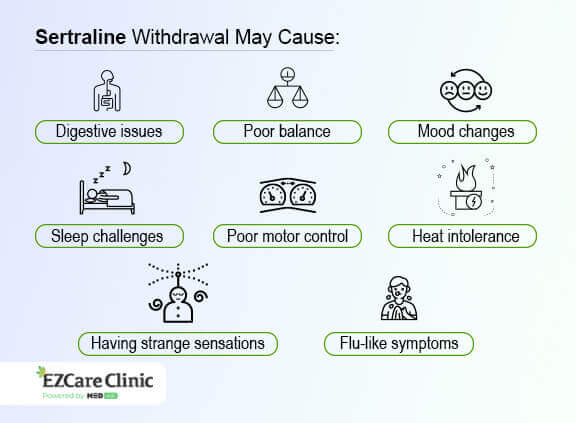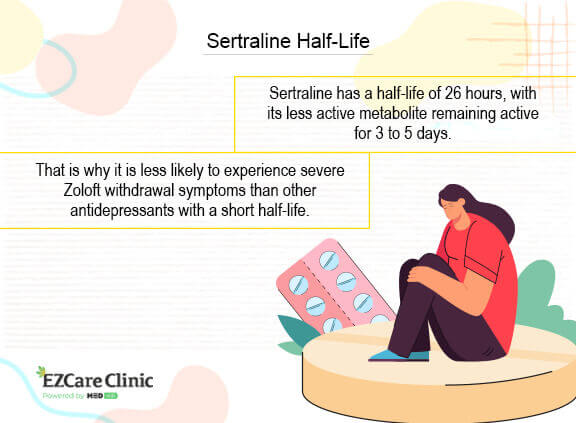Antidepressant withdrawal symptoms are a common occurrence among patients using anti-depression drugs. The condition is also known as antidepressant discontinuation syndrome. It happens due to the brain adjusting to the changing levels of certain brain chemicals affected by the drug a patient was taking.
The prevalence of withdrawal symptoms is quite high, with many studies showing that about
Sertraline is one of the most widely used antidepressants making it more likely that a significant number of people will experience Sertraline withdrawal symptoms.
What Is Sertraline?
Sertraline is a drug sold under the brand name Zoloft. It belongs to a class of antidepressants known as selective serotonin reuptake inhibitors. These medications work by acting on the neurotransmitter serotonin, increasing its levels in the brain to help better communication between brain cells and relieve depression symptoms.
The FDA approved Zoloft in 1991 for the treatment of the following conditions:
- Major depressive disorder
- Panic disorder
- Social anxiety
- Obsessive-compulsive disorder
- Post Traumatic Stress Disorder
- Premenstrual Dysphoric Disorder
It is also used off-label for the following conditions:
- Generalized anxiety disorder
- Binge eating disorder
- Bulimia nervosa
- Body dysmorphic disorder
- Premature ejaculation
How Sertraline Withdrawal Happens
Sertraline works by preventing the reabsorption of serotonin, which increases its levels in the brain. When a patient stops taking the medication abruptly, serotonin levels start dropping, and they finally return to pretreatment training. As such, their body and mind try to adapt to this sudden change leading to withdrawal symptoms.
Sertraline has a half-life of about one day (26 hours), with its less active metabolite remaining active for 3 to 5 days. That is why it is less likely to experience severe Zoloft withdrawal symptoms than other antidepressants with a short half-life like paroxetine and fluvoxamine because it takes longer for the patient’s system to clear this drug than other SSRIs with a shorter half-life.
Stopping the use of Sertraline abruptly gives one’s brain no time to adjust to the changes resulting in withdrawal symptoms. Therefore, patients must taper off Zoloft following a schedule set by their doctors.

When Do Symptoms Kick in, and What Is Their Duration?
How fast the symptoms kick in and how long they last depend on several factors. These include:
- the medication dosage;
- the schedule the patient used weaning off Zoloft;
- one’s medical history;
- the duration of intake.
Abruptly stopping Zoloft is almost guaranteed to result in a severe experience of withdrawal symptoms, and they may last longer. Also, people who have used Zoloft for four weeks or longer are more likely to experience the discontinuation side effects than those who have used it for less than four weeks. That is because it takes about four to six weeks for Sertraline to fully take effect.
Typically, patients coming off Sertraline feel awful when 90% of the drug leaves their body. That means patients will start seeing the effect of the drugs about three to five days after stopping the medication use. The symptoms generally last for about one week to two weeks. However, some patients can end up experiencing them for several weeks to months in cases of acute discontinuation syndrome.
Symptoms of Sertraline Withdrawal
Withdrawal symptoms from Zoloft vary from one individual to another. There are, however, some common symptoms, including:
- Insomnia
- Nausea
- Imbalance
- Tremors
- Flu-like symptoms
- Confusion
- Headaches
- Brain zaps
- Irritability
- Lethargy
- Anxiety
- Rebound depression
However, given the important role serotonin plays in the body, the range of Zoloft withdrawal symptoms is wide. Below is an overview of the potential effects of discontinuing using Sertraline:
- Digestive system: loss of appetite, nausea, cramps, diarrhea, vomiting.
- Poor balance: difficulty in walking as a result of light-headedness or dizziness.
- Mood effects: frequent mood swings, irritability, anger, anxiety, panic, mania, suicidal thoughts, agitation, and depression.
- Sleep challenges: insomnia, nightmares, unusual dreams, having vivid or excessive dreams, etc.
- Poor motor control: unsteady gait, tremors, restless legs, and muscle tension. A patient may have difficulty controlling speech and chewing movements in severe cases.
- Heat intolerance: a patient could become intolerant to high temperatures, which is evident through excessive sweating and flushing.
- Having strange sensations: a patient can become hypersensitive to sound, have strange tastes, feel ringing in the ears, or feel pins and needles. One can also experience brain zaps that feel like an electrical shock.
- Overall flu-like symptoms: muscle pain, headaches, fatigue, and weakness.

How to Manage or Prevent Withdrawal-type Symptoms
With the help of your healthcare provider, it is possible to lessen withdrawal symptoms to some extent or avoid them. Common practices include:
- Gradual tapering: Your healthcare provider may create a tapering schedule, according to which you will reduce the dose of medication gradually, allowing your body to better adjust to changes.
- Symptom management: You may receive medication for symptomatic treatment of sleep issues, anxiety, or nausea as consequences of sertraline withdrawal.
- Talk therapy or counseling: A therapist or a counselor can offer various coping techniques and help you choose the most effective ones in your case. Also, psychotherapy may be necessary to support the effects you got from pharmacological treatment.
- Lifestyle changes: Regular exercise, a balanced diet, and quality sleep can support overall well-being and mitigate withdrawal effects.
Remember to keep in touch with your healthcare provider and attend follow-up appointments as planned. During these sessions, you can share your concerns about sertraline withdrawal and get timely recommendations and support.
Coping Strategies for Sertraline Withdrawal Symptoms
The best coping strategy for managing the discontinuation syndrome is tapering off Zoloft under a doctor’s supervision. This essentially involves weaning off Sertraline by gradually reducing doses over time. For example, a doctor can reduce their dosage every week or 5-7 days so that a person on a 100 mg dose may end up on a dosage of about 25 mg before altogether stopping the drug.
Other tips include:
- Psychotherapy: This helps one improve their mood and manage their anxiety which helps them cope with the symptoms better.
- OTC medications: These help to manage flu-like symptoms and nausea. They include antipyretics and anti-nausea medications.
- Lifestyle changes: At least 45 minutes of moderate activity at least three times a week will improve mood and reduce stress. Keeping a regular sleep schedule and enough sleep also improves the symptoms. Finally, a nutritious diet, staying hydrated, and reducing caffeine intake will help you feel rejuvenated.
Summing Up
Withdrawal from Sertraline can feel awful and even seem like your condition is getting worse. It is a normal occurrence and does not mean you are addicted to the drug. However, with the right Sertraline withdrawal schedule, you can significantly reduce these symptoms or even prevent them altogether. Connect with MEDvidi to know more about a tailored tapering plan and stick to it.













